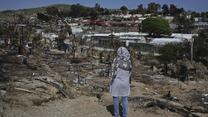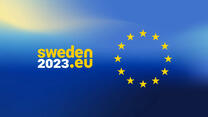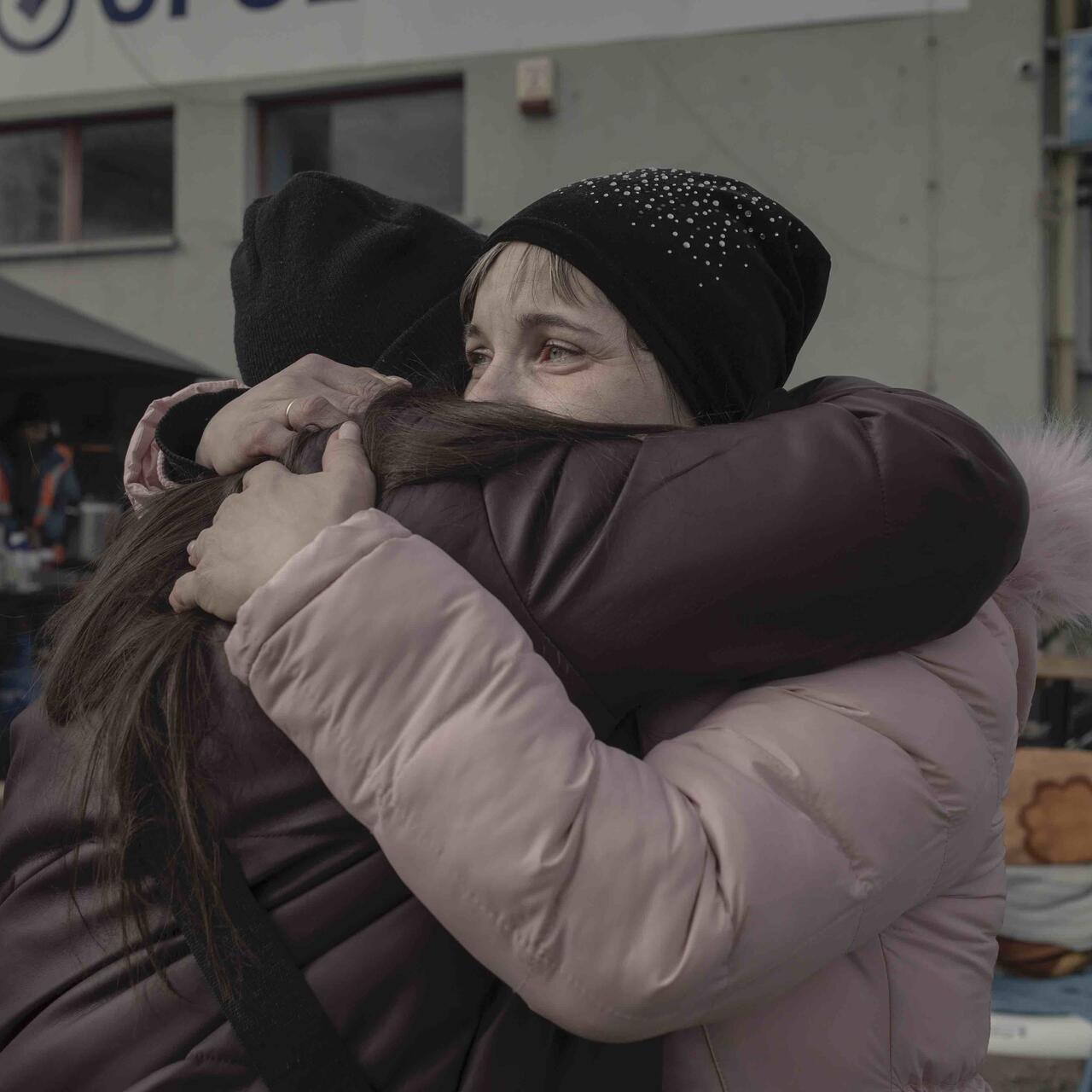
As refugees continue to flee Ukraine, the International Rescue Committee (IRC) outlines eight key actions the EU and its member states must take to ensure a humane and effective response.
What is happening?
More than 10 million people have been displaced by the devastating conflict in Ukraine
Since 24 February, the number of people fleeing Ukraine and crossing international borders has continued to rise exponentially. In the first month of the conflict alone, almost a quarter of Ukraine’s population, or more than 10 million people, have already been displaced. UNHCR has stated that over 3.8 million refugees have already fled into neighbouring countries. Over half of these (more than 2.2 million) are in Poland, with others reaching Romania, Moldova, Hungary, Slovakia, or moving on to elsewhere in Europe. Another 6.5 million are estimated to have been newly internally displaced within Ukraine. Many million more are stranded in Ukrainian cities affected by conflict including Mariupol, Chernihiv, Kharkiv, Mykolaiv and Sumy, living through the horrors of urban conflict. These people require urgent humanitarian assistance and are exposed to safety and security risks.
For those who flee, the journey is not without risks, and many have faced unbearably long waiting times in freezing temperatures, and difficulties in boarding transportation or crossing the border. People are arriving in distress, with significant health risks, and with few belongings, often leaving behind many of their documents. The vast majority of those leaving the country are women and children – who often bear the brunt of crises and face greater risks of violence, exploitation and abuse – as well as the elderly. More than half of Ukraine’s 7.5 million children have been forced from their homes.
As the conflict escalates further, civilians are unlawfully targeted and breaches of International Humanitarian Law (IHL) - including attacks on critical infrastructure and denial of access - continue to mount, the number of people forced to flee their homes will continue to rise.
European states have been united in offering a safe haven
In these first weeks of the response, European citizens and governments have taken commendable steps to prepare to receive refugees fleeing Ukraine in a spirit of European solidarity. Eastern European states directly neighbouring Ukraine have committed to keeping their borders open to all people fleeing. Governments have invested in creating new reception centres, expanding the support available for refugees, and fast-tracking temporary residence permits. Volunteers and civil society actors have been meeting refugees upon arrival to offer food, hot drinks, and blankets, and housing them in their homes.
Across the EU, other states have stressed their readiness to help, including by providing humanitarian support to Ukraine and neighbouring countries, supporting reception and protection efforts within Europe, and facilitating safe passage within the continent.
On 3 March, EU member states agreed to activate the Temporary Protection Directive (TPD) for most people fleeing Ukraine, granting them temporary protection in Europe for up to 3 years, without having to apply for asylum and placing pressure on asylum systems, and with a broad set of rights including access to work, accommodation, health care, social assistance and education across the EU. This is a vital step to ensure that states can manage the response effectively and people receive the swift support they need. Moreover, on 8 March, the European Commission announced a range of measures to boost EU funding for member states’ refugee responses.
Yet, beyond the welcome emergency response, the EU and its member states must take concrete steps to guarantee durable protection and sufficient support for people fleeing the conflict, and enable them to rebuild their lives. Volunteers, NGOs and civil society actors have already signalled the urgent need for greater coordination and systemic support from authorities. A growing number of people are now arriving alone and vulnerable, without resources or friends and family to support them elsewhere in Europe, so the help they need will also continue to rise. It is vital that this openness and solidarity with refugees continues.
The IRC highlights eight priority actions for a humane and effective refugee response, as the conflict continues to escalate.
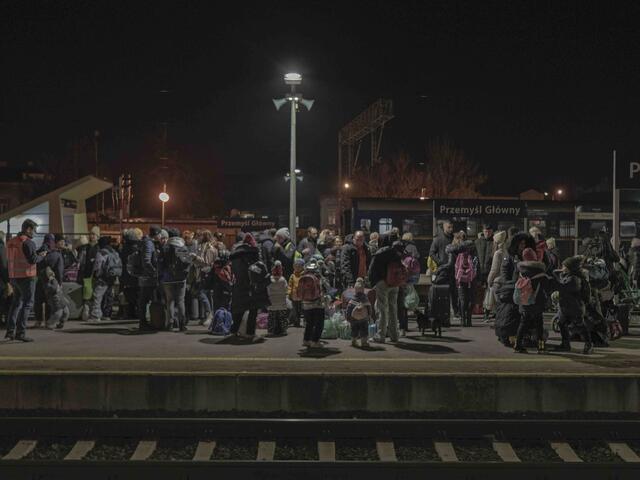
What needs to happen?
1. Ensure an inclusive and effective application of temporary protection for people fleeing Ukraine
The IRC firmly welcomes EU leaders’ decision to trigger the TPD on 3 March 2022, enabling the EU-wide recognition of the protection needs of people fleeing Ukraine, as an eminently humane and practical response. Granting people a clear, predictable and durable legal status, with swift access to rights upon arrival, is vital for their inclusion and wellbeing. This is the first time the TPD has been triggered since its adoption in 2001; the failure to activate this tool in response to earlier humanitarian emergencies or refugee arrivals – such as in Syria in 2015 or Afghanistan in 2021 – is a regrettable missed opportunity, and the IRC urges states to seriously consider its broader use going forward.
It is now up to EU states to implement the decision and secure the protection and access to rights to all people fleeing Ukraine in an effective and inclusive way. The European Commission must closely monitor this implementation and promptly address any inadequate standards or limitations in scope.
States should:
- Offer protection to all people forced to flee Ukraine, and not only Ukrainian nationals and permanent residents. Several groups of residents in Ukraine who will be nonetheless displaced by the conflict are not necessarily covered by the TPD decision. States should ensure that all people fleeing Ukraine and who cannot return home, such as students, foreign workers, and people who had sought asylum in Ukraine, are also granted temporary protection. We welcome the steps already taken by states such as Spain and Finland to do so.
- Likewise, states should minimise documentation and procedural requirements when determining people’s eligibility for temporary protection, which may unduly exclude people who fled without documents to prove their identity, legal residence, nationality, or the risk of persecution in their countries or regions of origin.
- Recall that the TPD provides for minimum EU-wide standards, and in no way precludes states from providing a more favourable protection status and conditions for people covered by the measures, including longer-term residence rights or more extensive access to education or family reunification. States should make full use of these options. They also must ensure that access to fair, full, and well-resourced asylum procedures is respected alongside the TPD for those who request it.
- Ensure humane responses for any third country nationals not eligible for temporary protection, including by upholding their safe passage into Europe; granting access to asylum procedures, leave to remain, or temporary residence permits as appropriate; and affording them enough time to make travel arrangements to their countries of origin.

2. Ensure safe passage into Europe, promptly and without discrimination
As ever, the EU must ensure safe passage and access to its territory for asylum seekers, guaranteeing their safety and protection. All European states must continue to uphold their commitments to offer protection to refugees in need, and promptly remove undue obstacles to accessing their borders. Flexibility as to entry requirements and innovative solutions will be necessary to respond to the rapidly evolving situation.
States should:
- Make full use of the steps to ease border crossings outlined by the European Commission’s guidelines for external border management, issued on 3 March. This includes relaxing border checks, allowing crossings outside formal entry points, increasing flexibility as to entry requirements and authorising entry on humanitarian grounds where necessary.
- Ensure safe passage and full access to asylum procedures for people fleeing Ukraine regardless of their citizenship, nationality, religion, or ethnicity, and work with Ukrainian officials to that end. The IOM estimates that there were over 470,000 third country nationals in Ukraine before the start of the conflict, including asylum seekers and refugees from other regions, Afghan evacuees, as well as foreign students and workers. All people fleeing the conflict must be allowed access to protection without discrimination.
- Facilitate the work of EU agencies and national independent border monitoring mechanisms and ensure full access for national human rights bodies, NGOs, humanitarian organisations, and journalists to border areas. These bodies can be instrumental in monitoring practices at the border, including ensuring that safe passage is offered without discrimination.
- Facilitate safe passage from Ukraine and within Europe. Humanitarian corridors, family reunification, education and labour mobility schemes, and other pathways should be made available across EU member states. These would enable people to accessibly and safely join their friends and family members, or reach those countries where they have a connection or support networks. We welcome the many expressions of solidarity and practical measures already established to that end.
- Ensure an inclusive response to refugee arrivals. In displacement contexts, women and girls are often the most adversely affected and bear the brunt of crises. The situation in Ukraine is no different – especially as women and girls are travelling alone and could be at greater risk of exploitation and abuse. States must ensure that family unity is preserved at border crossings and that support upon arrival is able to target the specific vulnerabilities that displaced women and girls often face, including to gender-based violence (GBV). Gender analyses need to underpin every aspect of the humanitarian response to ensure that women and girls’ voices and needs are not deprioritised through a de facto male-centric response. We also note that older people and people with disabilities may face additional barriers in leaving Ukraine and require support in accessing pathways to safety.
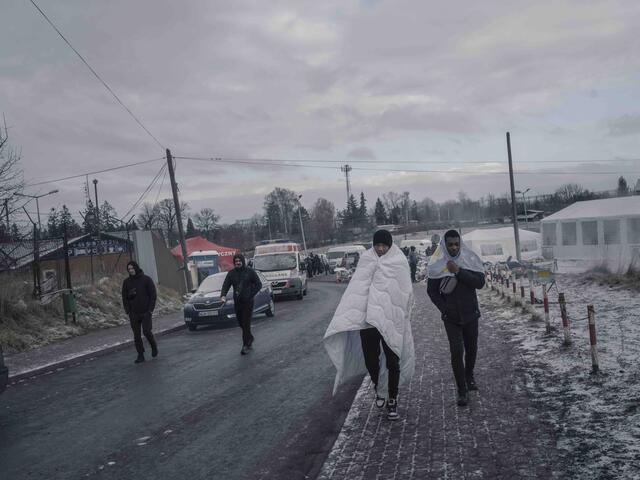
3. Continue to invest in urgent reception capacity and sufficient support upon arrival
All European states, and particularly those neighbouring Ukraine, must continue rapidly expanding their capacity to receive people seeking protection, in preparation for additional arrivals and the possible protracted nature of the conflict.
States should:
- Continue investing in preparedness, reception, and meeting people’s urgent needs as they reach the EU. This includes significant investments in dignified and sufficient reception conditions, as well as immediate access to food, water, shelter, and clothing, as well as medical, psychosocial and trauma assistance upon arrival. States must also ensure adequate access to legal aid and to information, in the right languages and accessible formats, to enable people to access the support and rights they are entitled to and make informed decisions about their journeys. The availability of quality, trauma-informed and accessible mental health and psychosocial support services (MHPSS), including in terms of language and cost, will also be vital. Child protection actors should also be supported to assist unaccompanied children in particular, and appropriate accommodation and assistance be made available.
- Prevent and respond to gender-based violence. Experts warn that overcrowded reception centres are high-risk areas for GBV, including sexual exploitation and abuse. GBV response services, referral pathways, and complaints mechanisms should be immediately available. Crucially, GBV prevention must also be prioritised across other sectors like food and shelter to ensure basic safety provisions, such as locks on communal toilet doors and showers.
- Be fully transparent around concrete preparations, capacity and contingency plans, to enable civil society, local authorities, EU agencies, international organisations and other member states to provide sufficient and well-tailored support.
- Promptly request and facilitate the support of EU agencies, particularly the EU Asylum Agency (EUAA), and other EU member states to enable a sustainable and effective response to refugee arrivals.
- Make full use of the emergency funding being made available by the European Commission, including the funds as part of the Cohesion Action for Refugees in Europe (CARE) proposal, unspent Home Affairs funds from the past EU budget, the 2022 REACT-EU recovery funds, as well as Home Affairs funds within the new budget for 2021-2027.
4. Mobilise a truly pan-European response in solidarity with refugees and those states hosting them through concrete, durable and significant support
Responsibility for receiving and protecting people arriving in Europe should be shared equitably among European countries. The IRC greatly welcomes the expressions of solidarity expressed by EU institutions and member states in recent weeks. They must continue to support states of first asylum within Europe to build their capacity to welcome new arrivals, deliver adequate reception conditions, and full access to asylum procedures.
- Material, financial and practical support, including direct involvement from the EUAA, should be made available to those states most affected. Emergency funding from the full range of EU financial instruments, and notably the Asylum, Migration and Integration Fund (AMIF), should be mobilised to reinforce states’ reception capacity, asylum systems, and support services provided by civil society.
- States should also explore ways to provide emergency cash for displaced people to purchase food and other basic needs.
- The European Commission should continue using the tools and platforms as its disposal to coordinatethe European refugee response, identify gaps and immediate needs so these can be met quickly, promote information and best practice sharing, and foster cooperation and solidarity among member states. These include the new Crisis Blueprint Framework, the Integrated Political Crisis Response (ICPR), and the Solidarity Platform in the context of the TPD. All member states should participate actively and offer support through these platforms.
- Where appropriate and necessary, EU member states should put in place systems to relocate and host people fleeing Ukraine, including third country nationals who may lack visa-free entry to EU states, to facilitate an efficient, fair and equitable pan-European response.
- Moldova, which is not an EU member state and has received over 360,000 refugees from Ukraine, should also receive adequate humanitarian support to assist people arriving in its territory, in addition to transfers of refugees to other EU member states.

5. Step up humanitarian diplomacy to safeguard humanitarian access and ensure significant humanitarian support for Ukraine
The ongoing conflict is already resulting in critical, rapidly deteriorating humanitarian needs in Ukraine. In addition, many people forced to flee their homes will be displaced internally, requiring assistance to rebuild their lives. We greatly welcome the €500 million in humanitarian aid pledged by the EU for Ukraine and neighbouring countries supporting refugees, as well as the assistance provided through the EU Civil Protection Mechanism. The EU and its member states should continue offering support to Ukraine to support conflict-affected and displaced people within its territory, and address the complex humanitarian needs arising.
- Call for an immediate cessation of the conflict and safeguard humanitarian access. European governments must step up humanitarian diplomacy for an immediate cessation of the conflict in order for humanitarian organisations to reach people in the most conflict-affected areas with critical humanitarian aid. Maintaining channels of communication should be a priority tin order to secure commitments from all military actors to the delivery of principled humanitarian assistance.
- Ensure donor funding reaches frontline responders through a mix of funding channels. Reaching Ukrainians with urgent humanitarian aid will require assistance through various channels including, but not limited to, the UN. Local Ukrainian NGOs have played a key role in the response in the east since 2014, and partners across the country should be supported to scale up their activities independently, and in partnership with international NGOs. Funding should be made flexible to respond to rapidly changing needs – including by establishing multi-year funding to support new capacity-sharing partnerships – and be made available to a wide range of civil society organisations, including women’s rights organisations. To ensure that EU funding gets to where it is needed most, the needs of women and girls should be prioritised, for example by making GBV a priority of the EU’s various funding instruments.
- Work with the Ukrainian government to support the protection and humane treatment of refugees, asylum seekers, and other third country nationals within their territory, including their effective access to safety and equal ability to leave the territory.
6. Secure the status of Ukrainian nationals already in Europe
European states must ensure that Ukrainians already within their territory and who arrived before 24 February do not find themselves in limbo following the conflict and rapidly evolving situation in the country.
States should:
- Ensure Ukrainian nationals within the EU, including migrant workers on temporary work visas and people whose asylum applications had been rejected, have their status regularised and be granted access to the TPD, refugee status, or equivalent protection. Rejected asylum applications may need to be re-examined in light of the evolving situation and the grave risks in the country.
- Immediately withdraw any designation of Ukraine as a ‘safe third country’ or ‘safe country of origin’. Ukraine still features on several countries’ such lists, including Greece. In line with UNHCR recommendations, states must remove Ukraine from safe country lists, refrain from applying accelerated asylum procedures to asylum applications by Ukrainian nationals or residents, and uphold the same reception conditions as for other asylum seekers.
- Moreover, all forced returns to Ukraine must be formally suspended for the foreseeable future given the volatile and uncertain situation.
7. Beyond the emergency phase, prepare to address the long-term needs of refugee arrivals and ensure durable political commitments are in place
Beyond the immediate response of the past weeks, which has involved a remarkable mobilisation of civil society and the Ukrainian diaspora in Europe, EU states must now translate this momentum into a durable response that meet the long-term needs of refugees arriving in the Union. Reinforced capacity, resources and political commitments must be sustained for as long as protection needs remain for people fleeing Ukraine.
- An inclusive framework through which to empower new arrivals to fully participate in their local communities and regain control of their futures could be transformative for refugees and receiving communities alike. Beyond emergency funding, the EU should urgently consider how to channel its structural and investment funds to ensure that those arriving from Ukraine are fully included in multi-billion Euro COVID-19 recovery plans. This includes re-programming the React EU funds for 2023 to ensure that third country nationals are eligible to participate in the programme, provide support for regions hosting people who have fled Ukraine, and promote their labour market integration and quick access to education and training, including language courses. States should also consider modifying the recently agreed National Recovery and Resilience Plans to establish specific Components, and/or new investments within existing Components, to cater for the needs of people with temporary protected status who have fled Ukraine and maximise their opportunities to contribute economically, socially and culturally to their new communities.
- States must fully resource their protection and integration systems to support new arrivals in rebuilding their lives – for example, in finding affordable housing, accessing services, strengthening their language skills, finding work, or enrolling their children in schools. The IRC’s experience in supporting refugees across Europe has highlighted the importance of investing in quality integration support from day one. However, many European states are yet to implement the recommendations of the EU Action Plan on Integration and Inclusion published by the European Commission in September 2020.
- Experience from past protracted crises also shows that refugee women and girls often face increased barriers in accessing essential services and opportunities for safe and decent work in host communities – which may include increased risks of exploitation, discrimination or social isolation, as well as unpaid care and childcare responsibilities. All policies related to asylum and integration must be informed by gender analysis to ensure that they remove the discriminatory, practical and regulatory barriers to women and girls’ protection and empowerment. An intersectional analysis that also considers factors such as disability and age is also critical to avoid the unintentional deprioritisation of marginalised groups.

8. While reinforcing the response to refugees from Ukraine, do not forget or overlook other grave protection needs within Europe
The IRC greatly commends the solidarity offered to people fleeing Ukraine by governments across Europe in the past weeks and the positive efforts made to ensure their dignified reception and secure status. This tragic emergency must serve as a lasting reminder of the values that Europe holds dear, and of what it can accomplish when it acts jointly, in a spirit of solidarity, to uphold refugee protection. We urge states to display this same level of preparedness, commitment and humanitarian leadership to other displacement situations and people seeking safety in Europe, who have regrettably received a very different treatment in the past – often facing violent pushbacks, detention, and the denial of international protection. Other ongoing displacement situations, and the fate of asylum seekers elsewhere in Europe or refugees awaiting resettlement, have not disappeared as a result of the crisis in Ukraine, and must not be forgotten or under-resourced as a result.
Now, as ever, the IRC continues to call on states to put refugee protection at the centre of its asylum and migration policies:
- Following the practices established in recent weeks, employ a similarly coordinated, effective and humane response – avoiding fearmongering and panic-driven containment responses – in response to refugees seeking safety in Europe.
- Uphold access to protection across the EU’s borders. This includes ensuring access to the territory for asylum seekers, addressing human rights violations at European borders through the establishment of independent border monitoring mechanisms, and upholding access to fair and full asylum procedures, no matter the circumstances of arrival and without undue restrictions.
- Ensure humane and dignified reception systems across Europe, which respect people’s dignity, protect their mental health, and foster their inclusion into European societies, in line with the aims of the EU Action Plan on Integration and Inclusion. Closed and Controlled-Access Centres, such as those recently inaugurated in the Greek Aegean Islands, risk becoming the norm across Europe. We urge states to reject these models and urgently invest into community-based accommodation.
- Establish a fair, predictable and sustainable system to share responsibility for people seeking protection in Europe, centred on relocations. States must ensure that solidarity with refugees and with states of first arrival is at the core of any progress on the New Pact on Migration and Asylum negotiations. In the meantime, they should build on the success of recent ad hoc voluntary relocation schemes.
- Significantly expand safe and regular pathways to protection, including by increasing and fulfilling European refugee resettlement pledges, which continue to fall far short of global resettlement needs and the EU’s capacity alike. Resettlement and humanitarian admission pledges for 2022 must be implemented promptly and in full.
- Place refugee protection and humanitarian principles at the centre of the EU’s external action in response to growing humanitarian needs, including through urgent action to address the deaths and pullbacks at the Mediterranean Sea.

What the IRC is doing to help
The IRC is working with partners to assist civilians who have been forced to flee their homes.
In Ukraine, we are working with local partners to provide emergency assistance to internally displaced people. So far we have supported evacuation efforts for women and children, provided critical information services about registration for displaced people, housing, employment and refugee rights as well as psychosocial care through a dedicated hotline. We have also been able to provide material support including access to essentials such as groceries, blankets, warm clothes, electrical appliances and stoves where gas and electricity has been destroyed.
In Poland we are working through partners to provide specialised services to refugees including psychosocial support, cultural assistance and translation services. A dedicated hotline service also provides legal assistance and support for women. Material assistance has included medical equipment for teams operating at refugee reception centres and border crossing points along the Polish/Ukrainian border.
“We will work to respond where we are needed the most and with the services that are needed urgently," says IRC Senior Director of Emergencies, Lani Fortier.
What can you do to help
Find out how you to support people impacted by the crisis in Ukraine here, and share the Tweet below to stand in solidarity.
We stand in solidarity 💛 #Ukrainepic.twitter.com/Sws10ndLlk
— International Rescue Committee - EU (@RESCUE_EU) February 24, 2022
